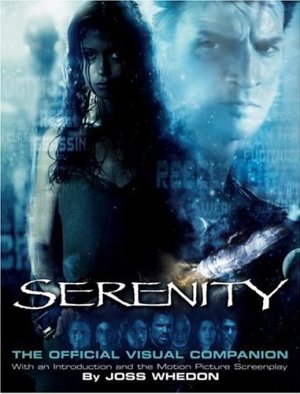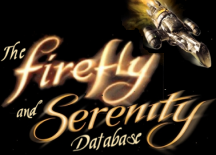Boaz
Happy Easter!
- Joined
- Jul 14, 2005
- Messages
- 6,549
The very first scene of the very first episode is meant to define Mal. He did not lose, he was abandoned. And from that point whenever he accepted a person into his crew, then they were in the crew regardless.
Even against his better judgement, he refused to dump Simon and River at the end of the first episode. There are a few reasons for this... he liked to annoy the Alliance and he needed a medic... but Kaylee bled for them and Mal had killed for them. I think the latter two reasons really resonated with the blood his squad of browncoats shed and the number of men he killed in the war.... and you don't abandon comrades.
This is explicitly stated after River is saved from being burnt at the stake....
Simon: "Captain, why did you come back for us?"
Mal: "You're on my crew."
Simon: "Yeah, but you don't even like me. Why'd you come back?"
Mal: "You're on my crew. Why are we still talking about this?"
In Out of Gas, Mal orders everyone to abandon ship. After finding his crew has returned, he is deeply moved (although highly drugged). He is visibly comforted by their presence. And not just not the saving of human lives... Mal's world makes sense when the crew survives together.
Mal is bothered by Tracy in The Message, but quickly acts to defend him. In Mal's mind, a former squad member could become a crew member. But as soon as Tracy threatens Kaylee, Mal chooses his current crew over his former squad.
But in any story with multiple writers, every character will have discontinuities. Mal's forgiveness of Jayne's treachery broke the story for me. Mal repeatedly killed to defend his crew. He even killed Tracy, a fellow browncoat. Logically, Jayne's plan to collect on the reward for the Tams would also surely have resulted in the capture of Mal's crew... imprisonment, torture, hard labor, rape, death. And you expect me to believe that Mal would forgive this? Maybe he could forgive, but he'd never trust Jayne again. He had to exile or execute Jayne. I love Firefly, but this has always felt wrong to me.
I've never watched any other Joss Whedon show to make comparisons, but he left a few intended enigmas in this show. Inara's motives. Book's shrouded past. River's powers. I don't know if Whedon planned to ever explain River's powers. To me, River is meant to be a quest... a search for humanity... for the soul's reaction to a child or to a monster. To me, she's not a riddle to be solved... she's to be sought out... she's a mirror to reveal each person's heart.
Jayne sees her as a liability and a payday, so he tries to sell her. Jayne's monstrous character is revealed. Kaylee sees a potential friend until she witnesses River's abilities... and Kaylee is frightened.... frightened enough to give River up to Jubal in order to save herself. Kaylee's timid soul is revealed. Simon sees his dear little sister... his mei mei... and he sacrifices all he can to rescue her and River finally returns the favor at the end of the movie, "You take care of me, Simon. You've always taken care of me. My turn." Simon's loiving heart is revealed.
So how does Mal view her? He sees the monster and he sees the child. He clearly sees the threat, but he also sees that damage that caused her to be a threat. He holds both empathy and safety close. When River holds him at gunpoint, it seems he finally chooses, "I've staked my crew's life on the theory that you're a person, actual and whole..." Mal tries to deny God at every turn, but his desire to see goodness and beauty is revealed.
Even against his better judgement, he refused to dump Simon and River at the end of the first episode. There are a few reasons for this... he liked to annoy the Alliance and he needed a medic... but Kaylee bled for them and Mal had killed for them. I think the latter two reasons really resonated with the blood his squad of browncoats shed and the number of men he killed in the war.... and you don't abandon comrades.
This is explicitly stated after River is saved from being burnt at the stake....
Simon: "Captain, why did you come back for us?"
Mal: "You're on my crew."
Simon: "Yeah, but you don't even like me. Why'd you come back?"
Mal: "You're on my crew. Why are we still talking about this?"
In Out of Gas, Mal orders everyone to abandon ship. After finding his crew has returned, he is deeply moved (although highly drugged). He is visibly comforted by their presence. And not just not the saving of human lives... Mal's world makes sense when the crew survives together.
Mal is bothered by Tracy in The Message, but quickly acts to defend him. In Mal's mind, a former squad member could become a crew member. But as soon as Tracy threatens Kaylee, Mal chooses his current crew over his former squad.
But in any story with multiple writers, every character will have discontinuities. Mal's forgiveness of Jayne's treachery broke the story for me. Mal repeatedly killed to defend his crew. He even killed Tracy, a fellow browncoat. Logically, Jayne's plan to collect on the reward for the Tams would also surely have resulted in the capture of Mal's crew... imprisonment, torture, hard labor, rape, death. And you expect me to believe that Mal would forgive this? Maybe he could forgive, but he'd never trust Jayne again. He had to exile or execute Jayne. I love Firefly, but this has always felt wrong to me.
I've never watched any other Joss Whedon show to make comparisons, but he left a few intended enigmas in this show. Inara's motives. Book's shrouded past. River's powers. I don't know if Whedon planned to ever explain River's powers. To me, River is meant to be a quest... a search for humanity... for the soul's reaction to a child or to a monster. To me, she's not a riddle to be solved... she's to be sought out... she's a mirror to reveal each person's heart.
Jayne sees her as a liability and a payday, so he tries to sell her. Jayne's monstrous character is revealed. Kaylee sees a potential friend until she witnesses River's abilities... and Kaylee is frightened.... frightened enough to give River up to Jubal in order to save herself. Kaylee's timid soul is revealed. Simon sees his dear little sister... his mei mei... and he sacrifices all he can to rescue her and River finally returns the favor at the end of the movie, "You take care of me, Simon. You've always taken care of me. My turn." Simon's loiving heart is revealed.
So how does Mal view her? He sees the monster and he sees the child. He clearly sees the threat, but he also sees that damage that caused her to be a threat. He holds both empathy and safety close. When River holds him at gunpoint, it seems he finally chooses, "I've staked my crew's life on the theory that you're a person, actual and whole..." Mal tries to deny God at every turn, but his desire to see goodness and beauty is revealed.
Last edited:



